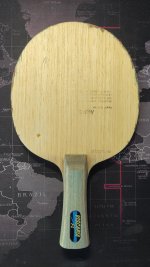This user has no status.
This user has no status.
Member
Thanks for the clarification 🙂Regular rubber cement and speed glue are not all that different. If you are saying to use speed glue but not to use rubber cement I am not sure what to make of that since the main difference is that speed glue has loads more solvent.
If you were using a ton of solvent on the Poly sealant and then rubbing, it would be a problem for the sealant. But the solvent from the glue evaporates so fast that it won't really do anything to the sealant if you are leaving the glue on and attaching the sponge to the blade.
And I have used speed glue and regular old rubbers cement, multiple different versions of traditional glues on blades sealed with poly sealant and had no problems; back in the speed glue days I did this an uncountable number of times.
But if you are using rubber cement, you also don't need to seal the blade because there is no water in a traditional rubber cement that has VOCs in it.
It is only water based glues (modern TT glue) that has water in it.
To clarify myself, I was actually saying IMO no products containing VOC solvents should be put on your blade at all -- including speed glue.
I also made the point that during the speed glue days, blades were made using glues that were highly VOC resistant (ie: Urea Formaldehyde / UF).
This however is no longer the case, (or at least it doesn't appear to be), as I'm seeing a lot more blade repair jobs where delamination has occurred due to players continued VOC use via speed glues and boosters... The solvents in the booster are eating away at the plywood's adhesive and causing serious blade damage.
I also pointed out since the VOC ban was put in place, manufacturers are (seemingly) moving away from using UF resins in their blades, as UF is highly toxic stuff to have in your workplace, and the VOC ban has made its use unnecessary. This also explains why blades are delaminating from VOC use now, but did not do so in the speed glue era.
I also pointed out while VOCs do evaporate quickly, this also means that you're breathing in highly volatile and carcinogenic VOC solvents in the process -- substances which are actually neurotoxic with repeated exposure... so it's still a good idea to stop boosting, and thereby minimise your lifetime exposure.
(Apologies for repeating myself, but I'm not sure if you read my earlier posts which put my comments in their proper context. Given VOCs are so dangerous to people's health on the whole, I thought it beared repeating 🙂).
Last edited:











